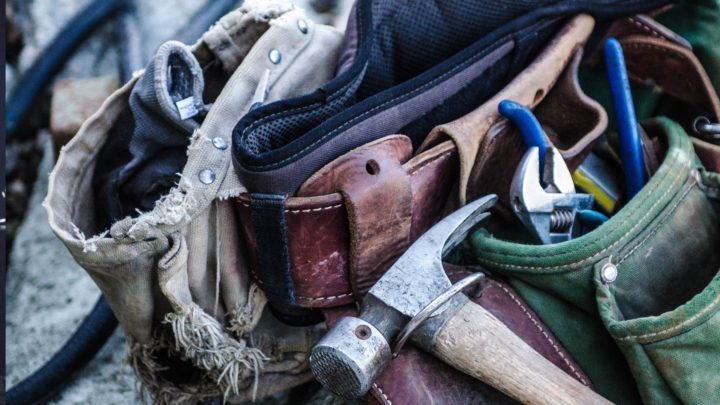No matter the size and scale of production, a diligent and determined production coordinator will help their unit production manager (UPM) plan for the best but prepare for the worst.
The production coordinator job description is varied. Some production coordinators are managers, other are accountants. It all depends on the needs of the shoot and the UPM who hired you.
Here are a few tips that will help you get hired, do better work, and learn how to become a production coordinator.
1. Become an Organization Aficionado
Hold up, hold up, before we go any further in our discussion of production coordinator jobs, we need to dig into the production coordinator job description.
The production coordinator is unique in that it has no set job description as mandated by the union -- in this case, the I.A.T.S.E. 871 (or the Local 871), which also covers your boss, the unit production manager.
This also means that unions don’t regulate a production coordinator’s salary, but more on that later.
What is universal is that the production coordinator acts as the hands of the unit production manager.
This means that they manage all the essential information of the project. Either by themselves or alongside other production coordinators who specialize in different aspects.
The essential information can include the production schedule, shot list, call sheet, production reports, or insurance documents.
As you might imagine, it’s easy to get lost in that mountain of paperwork. Most production coordinator jobs focus on being obsessively organized. Some use studio developed systems, but a great many develop their own.
What matters most is that you as production coordinator know where everything is and never worry that an important contract is lost.
2. Production Software for Production Coordinator Jobs
If hanging file folders and colored tabs do the job for you, then may the movie gods be with you.
On the other hand, if you’re looking for something a little more modern, there are multiple options for you. On the low end, you can scan every document that gets made and save it to multiple backup sites.
Including to that mysterious “cloud” that everyone’s always talking about!
If you’re looking for something a little more specialized, though, you can check out production management software like StudioBinder.
Doesn't that look nicer than stacks of paper?
No tedious scanning for you, you smart person.
3. Know Your worth - a Production Coordinator’s Salary
It’s important to know your worth as you gain experience and expand your network.
You may have worked on several low budget projects or even the occasional lo/no project but once you have a working knowledge of the requirements and the experience to back it up, negotiate your day rate to based on the production budget.
As we discussed earlier, production coordinators are covered by the Local 871. However, because the Local 871 doesn’t have a specific production coordinator job description, they also haven’t set minimums for a production coordinator salary.
This means you, more than any other person on set, need to be ready to negotiate for yourself and your salary. You can compare yourself to other production coordinators on ProductionBeast to get an idea of what the market is bearing.
That doesn’t mean there aren’t benefits to joining the Local 871! Health care and a pension fund are nothing to sneeze at. And maybe someday they’ll finally get around to defining the production coordinator job description.
Then you can finally have the security of a minimum production coordinator salary. Or maybe you’ll just get promoted and work as a unit production manager. That works too.
4. BE THE FIRST ONE IN AND LAST ONE OUT
Before anyone arrives at the production office, you should be there. You should watch the last PA leave.
Not only will this set the expectations, but also earn your PAs respect.
The morning is also a great time for a production coordinator to catch up on last-minute items before the start of the day. If you’re feeling especially swamped, it’s a great time to do an organization check.
As a production coordinator salary is usually a weekly flat rate, you’re expected to work as many hours as needed. Expect to stay late into the night to get things done.
Following this tip is much easier if you make the production office feel homey.
5. GET A COMFY CHAIR
Not listed in the production coordinator job description: sitting in the production office for hours.
If you have a stiff chair or back, you’re going to get distracted and not be as productive. Keep your workflow blazing by purchasing a comfy chair and/or standing desk.

Maybe don't go all the way to a treadmill desk.
Look here to find a list of affordable standing desks.
Your production office is going to be your home away from home. By investing in a production office throne, you can rule over your court of PAs longer, and more comfortably.
6. KEEP YOUR CELL PHONE PLUGGED IN
Seems like a no-brainer, but you can’t overlook that you need your phone on you, charged at all times.
Consider buying an external battery so you can always be in the loop when you aren’t in the production office.
Never let your phone out of your sight. What were you thinking leaving over there? When you’re contracted for production coordinator jobs, it’s especially important to have it on you at home.
7. BYOP (BRING YOUR OWN PRINTER)
Unless your production office has a computer, you’re likely bringing a laptop from home, which makes working from home after hours easier.
Woo.
But what about a printer?
Between the signs and production forms you have to print on a daily basis, your production office printer (and PA) is going to be in constant motion. But you’ll still have items to print.
By bringing your own printer, you can print all the last minute forms and notes you need while your industrial printer is hard at work.
On higher budget productions, you can expense a printer to the producer.
You can find cheap printers here.
8. Create a Professional Presentation
Ask any three-star Michelin chef will tell you: your food doesn’t matter if your presentation isn’t perfect.
What’s true for fine dining is also true for production coordinator jobs. Particularly if you’re in charge of call sheets.
Every member of production receives the call sheet from the producer all the way down to the production assistant.
It’s not enough that it has all the necessary information, it has to be easy to understand and to read.
It is, in fact, in the production coordinator job description to make sure that everyone understood when and where they were supposed to show up.
9. Remember to Follow Up
One of the potential production coordinator jobs is following-up with the entire crew to make sure everyone received and understands the call sheet.
Depending on the size of the shoot, you might share this responsibility with other production coordinators, department heads, and your unit production manager.
Obviously, you don’t want to spend your entire night calling people, so it’s important to find ways to automate this procedure. StudioBinder, for example, has tools that tell you if the crew has looked at the call sheet you sent out.
Apply this follow-up attitude to all your tasks. You can be the most efficient production coordinator of all time and assign tasks as soon as they pop up.
But your delegation skills won’t a mean a thing unless someone actually implements it.
Don’t fire off an email from the production office and expect it to happen on set. Follow up with PAs often, always check in, make sure your instructions were clear.
A proactive production coordinator is an effective one. In a job where communication is key, a simple follow up text of “all set?” goes a long way.
Ask yourself, “What are my PAs doing?” Then ask yourself how much does a production manager make a year?
10. MASTER EXCEL SPREADSHEETS
Regardless of whatever production software you use, you’re going to need to use Excel and/or Google Sheets. As a production coordinator, it’s highly likely you’ll have to balance some budgets made on Excel.
Knowing the ins and outs of Excel can speed up your process and save you time.
By reading up on Excel or watching a tutorial, you can learn all the shortcuts and tricks that will make Excel a million times easier for you.
11. IMPLEMENT A TASK MANAGEMENT SYSTEM
Production coordinators have to be good multitaskers. There’s no other way around it.
While you can attempt to tough it out and juggle tasks in your head (kudos), implementing a system will save you headaches and allow PAs to fill in the blanks more easily for you.
A multitasking system can be as simple as keeping a notebook, or as elaborate as an office cork-board full of notecards that need to be completed.
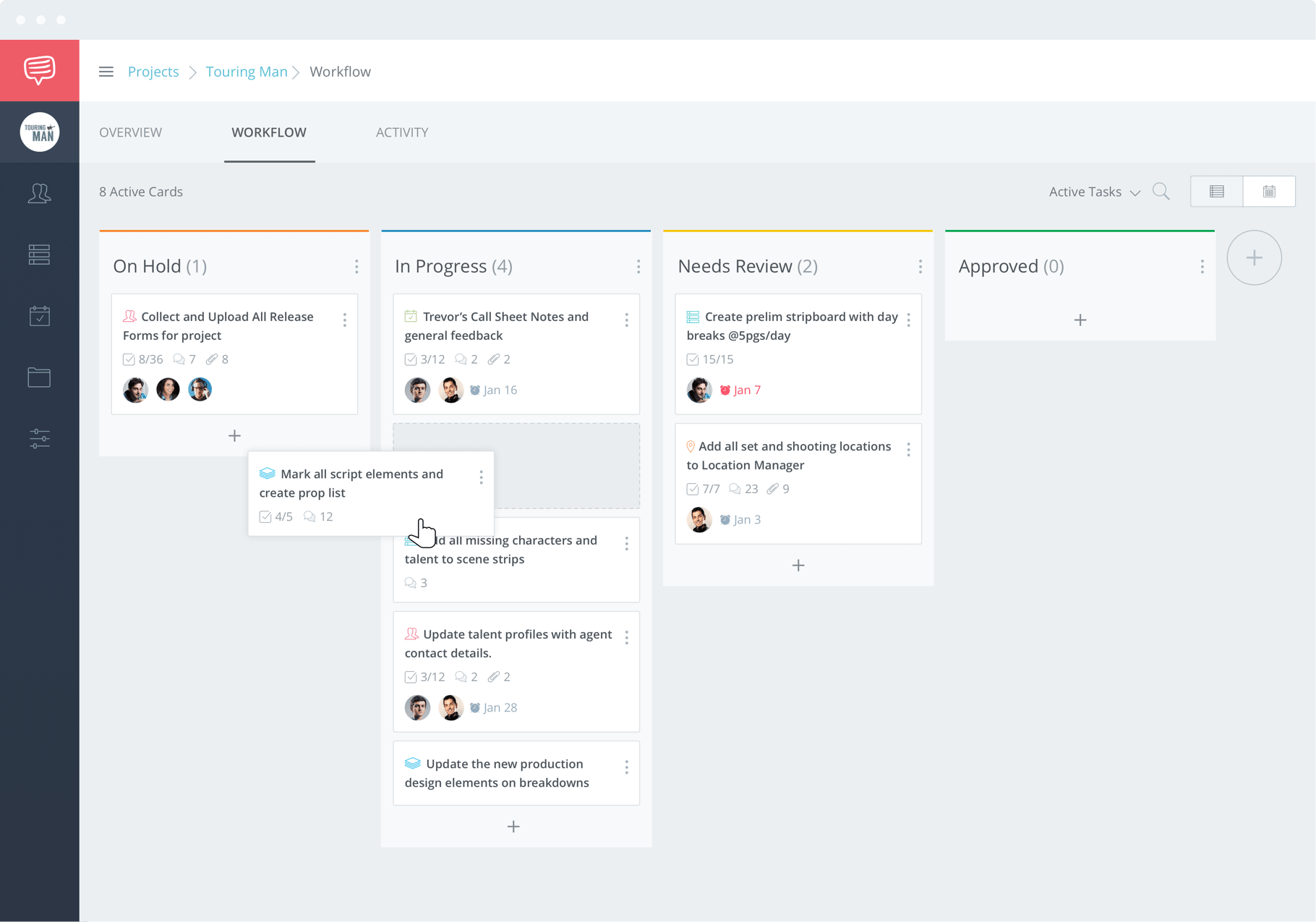
An example of project management in StudioBinder
In the digital age, film production software like StudioBinder makes it easy to multitask online.
On the Workflow page, you can now easily create cards, assign tasks, and invite PAs to check off items when they’ve completed them. You can create columns, ranging in urgency or types of tasks, to track how quickly stuff’s getting done.
12. BE BRIEF, BUT CLEAR
You’re going to be in constant communication with the production manager and your PAs, as tasks fly at you in every direction.
By keeping your phone calls, emails, and texts short, you free up time to get to the next task at hand. Check formalities and sentence structure at the production office door.
Just make sure your communication is thorough. While brevity is an essential skill for your production coordinator resume, if you’re not specific, you’ll have to repeat yourself to PAs over and over again.
Give instructions once.
Be specific.
And terse.
13. MAKE THE ENTIRE FILM CREW FEEL IMPORTANT
Without PAs, there is no production. Make sure they feel that way.
We’re not saying you should pull people aside and explain how running water bottles to the set is making Leonardo DiCaprio smile.

Or maybe it is. We don't pretend to know what makes Mr. DiCaprio happy.
We’re saying if a moment arises, tell a PA that he or she is doing well.
And you should definitely know their names.
You don’t have to build everyone up as production coordinator–you’re too busy to be a cheerleader.
By making everyone feel like they’re on a team to make a movie happen, you’ll increase morale and productivity.
14. DON'T ASSUME YOU'RE ALWAYS RIGHT
As production coordinator, it’s your job to juggle a thousand tasks at once. It’s easy to get so focused that you can miss the little details that make up the day to day in a production.
As such, always listen to what your PAs have to say. They may be aware of a more pressing issue that needs to be addressed than your organization system is.
We’re not saying you should always take your PA’s word and let him “assist” Mr. DiCaprio. Instead, always hear out your PAs as you assign tasks.
15. SAY THANK YOU
As production coordinator, you don’t have to be the nice guy. You have to be firm and lead your team.
Just don’t forget to say thank you. It takes two seconds and can go a long way.
When you delegate the very unsexy tasks, saying thank you can make PAs feel more valuable and get them to work harder for their minimum wage paycheck.
Writing a thank you note at the end of wrap is a simple way to get into the good graces of people whose lives you’ve controlled for the past couple months. It’s also a great way to ensure you’re hired again.
16. Be Relentlessly Resourceful
It comes as no surprise that a production coordinator must be resourceful as budgetary restraints and crew availability grow ever tighter.
This is where experience and persistence are your allies.
Having the knowledge, and moreover, the contacts, in an easily accessible database will be your lifeline when negotiating with vendors and crew.
Booking a reliable production assistant and punctual craft services in advance will keep production running smoothly and keep your crew and talent happy.
Building a well-rounded contacts list will benefit you immensely, especially when your sound guy or make-up artist calls in sick.
If you foster your network, it will do the same in return.
The production world can be a small one, so making friends is the path to success. It’s also crucial to know how to market yourself and find new production coordinator jobs.
You can use ProductionBeast to manage your network, as well as use to create groups of go-to workers you know you can trust.
Your resources are your irreplaceable and building a network will empower you while furthering your career in the competitive production world.
17. KEEP A ROLODEX OF VENDORS
Related to the above, you should also have a solid network of vendor contacts.
How is the crew getting to set? Where should the craftys buy from? Where should you order pizza from to set?
The production coordinator is responsible for coordinating vendor needs: travel, equipment, food, but especially travel. Before going into a production, keep a running list of vendors in your production office.
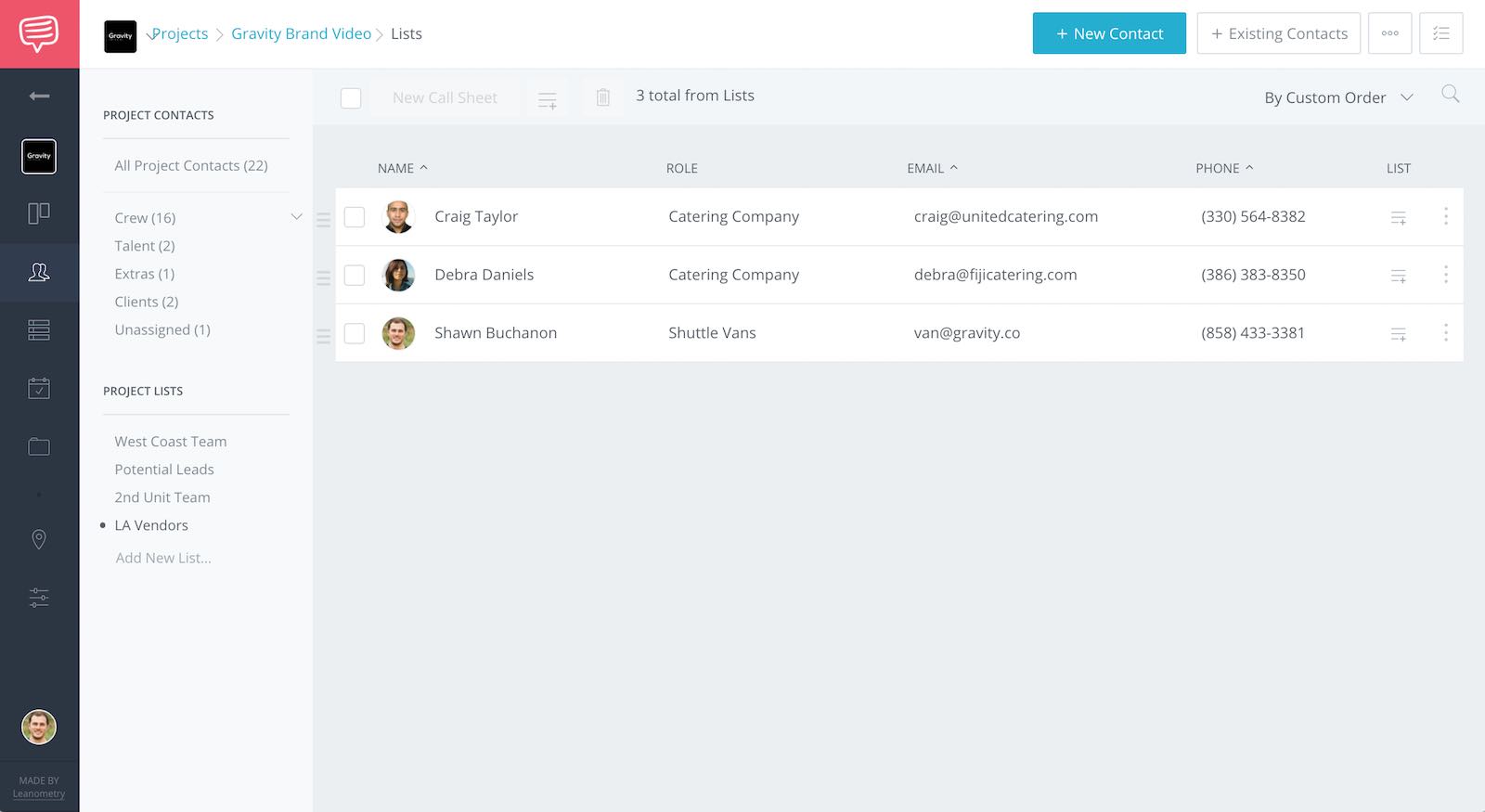
How you might store your vendor contact list in StudioBinder
Remember to book private cars for talent and shuttles for the crew. If you’re renting cars for PAs to drive, make sure they have a license and the insurance is included in the production insurance policy.
18. KEEP YOUR GAS TANK FULL
Since the role of a production coordinator is so malleable, you might have to run to the set from your ivory production office.
Maybe you need to deliver something after hours and all your PAs have gone home.
Maybe the producer wants to meet with you on set.
Or maybe you’re on a low budget film and you have to be on set to stock up the craft services table.
You never know, and as all prepared production coordinators know, keep your gas tank full.
19. Be Deliberately Detailed
The devil truly lies in the details of a project.
Directors are notorious for having extremely specific visions for a film or project and it’s the production coordinator who will help facilitate these details by creating shot lists and storyboards that capture the script before rolling camera.
Developing these aspects in pre-production allow the crew to take full advantage of each shooting day without having to cut shots or rush the talent or crew during filming. Your job isn’t to create those assets, but to make sure they’re on set and accessible.
You do not want to see what happens when the paper copy of the shot list goes missing and you don’t have a backup.
The devil truly lies in the details of a project.
Directors are notorious for having extremely specific visions for a film or project and it’s the production coordinator who will help facilitate these details by creating shot lists and storyboards that capture the script before rolling camera.
Developing these aspects in pre-production allow the crew to take full advantage of each shooting day without having to cut shots or rush the talent or crew during filming. Your job isn’t to create those assets, but to make sure they’re on set and accessible.
You do not want to see what happens when the paper copy of the shot list goes missing and you don’t have a backup.
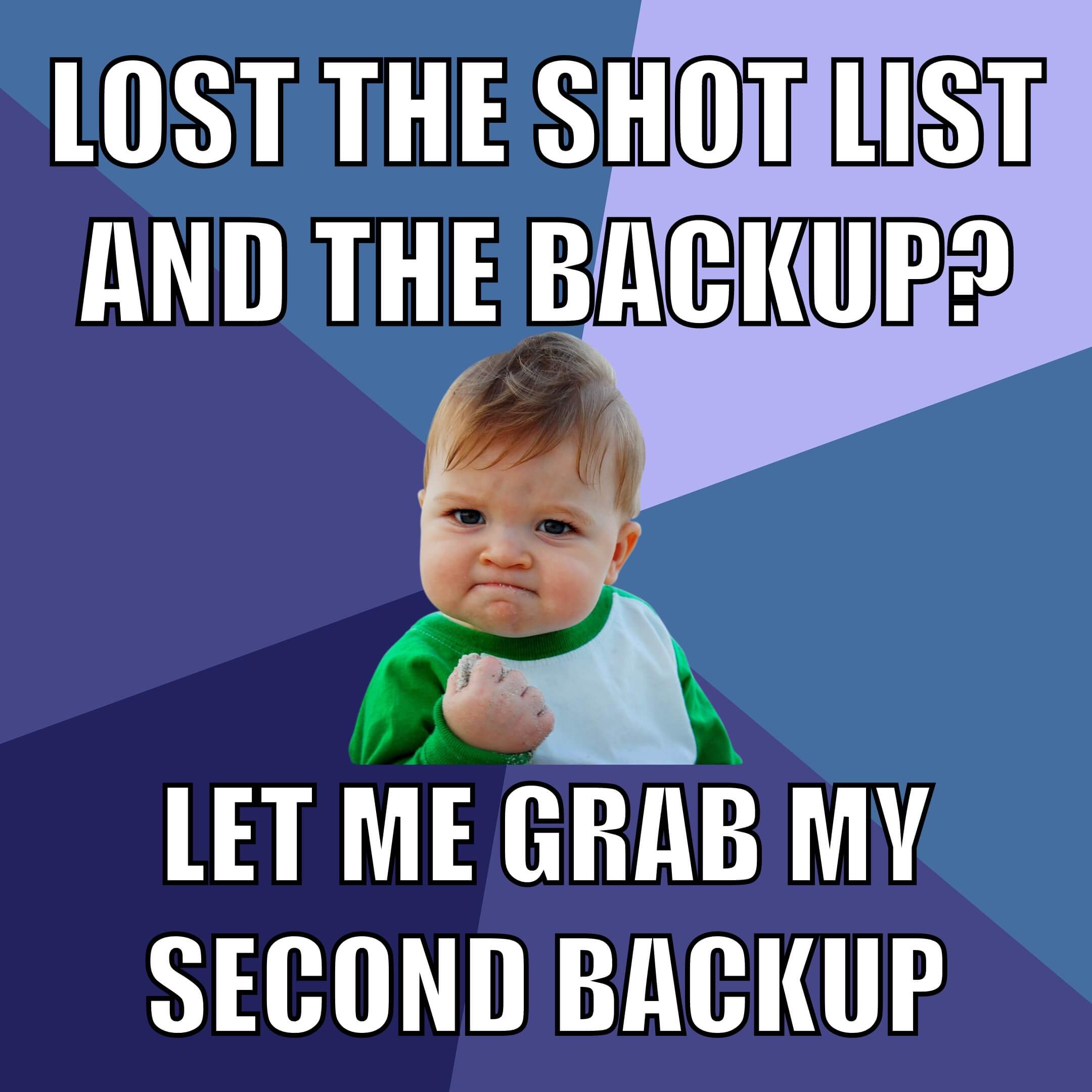
Don’t be surprised if the unit production manager is thanking you at the end of shooting as these details will prove both efficient and effective.
20. KEEP MULTIPLE VERSIONS OF YOUR PRODUCTION CALENDAR
What does a production coordinator do in film that isn’t scheduling?
From the shooting schedule to scheduling visits to the production office, you need to balance cast, crew, and producer’s schedules to avoid a trashcan fire.
When productions naturally veer off schedule, make sure to keep multiple versions of the schedule on-hand. Don’t just alter one master schedule.
In whatever software you use, it’s as easy as saving multiple drafts. If the production gets lagged, you can reference old production calendars and identify where need to make gains.
21. BUY CLOUD STORAGE
Paperwork, paperwork, paperwork.
A production coordinator eats, lives, and breathes this stuff. From work permits and insurance policies to daily production reports, there’s no limit to how much paperwork you’ll have to fill out.
In addition to the physical wrap binders you keep for all stages of production, be sure to keep a digital folder as well.
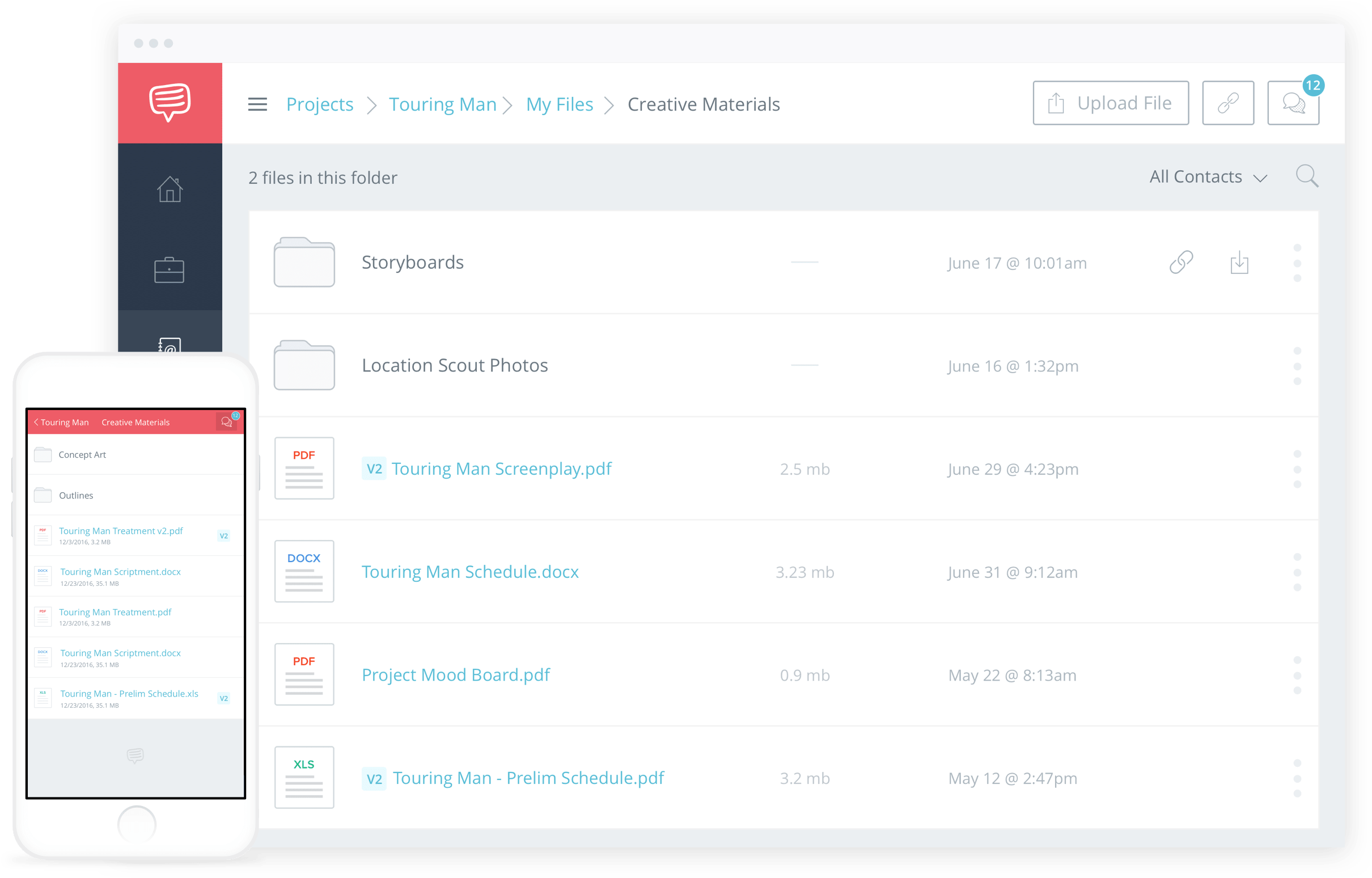
You'll sleep easier, assuming you sleep at all.
Trusted cloud storage like Dropbox and Google Drive can do the trick, while some production software like StudioBinder has this feature built in.
PRODUCTION COORDINATOR STORAGE DUTIES INCLUDE:
Dailies especially need to be sent out to directors and producers. By storing the footage digitally, you can easily send them off.
23. PLAN YOUR SPECIALITY EQUIPMENT
The ADs provide a list of needed equipment to the production manager, who in turn, orders all the proper cameras, booms, etc. As production coordinator, your job is to rent the specialty equipment.
However, by determining your specialty equipment early, you can bundle it in the large equipment rental, usually for a deal.
Perhaps you need an IMAX camera for a few days of the shoot. Regularly, you’d place the order mid-production and have a PA pick it up.
Being a proactive production coordinator, you can anticipate this step, avoiding last minute rental charges.
24. ALWAYS GET GROUP RATES
Hotels, food, transportation.
These are a few of the accommodations a production coordinator has to make. Just make sure you get a group rate.
As you put together your rolodex of vendors, check to see if your production company has a relationship with a certain hotel or shuttle chain. You can easily rack up reward points or save big time by staying loyal to one hotel chain.
Saving money on the budget means more money for the production coordinator salary
25. How to Practice Patience
Patience is a key among the production coordinator skills.
Being blinded by paperwork, responding to excessive email chains, coordinating equipment rentals, and encroaching deadlines can make a production coordinator’s head spin.
It’s important to remember that patience is not an inherited trait but a learned skill.
Practicing patience will allow you to respond to clients pushy emails in a diplomatic and unagitated manner.
Similarly, presenting a patient demeanor will demonstrate the sense of control that all production coordinators desire.
Experienced coordinators exude an air of confidence that often resides in the knowledge of preparation.
26. GET FIRST AID CERTIFIED
On most productions, assistant directors have to be trained in first aid. Because the roles of the production coordinator are so malleable, it’s not uncommon for you to have to jump into their shoes, especially on a low budget production.
It’s easy to find a class near you at a local Red Cross center. By having first aid on your production coordinator resume, you’ll stand out if you’re applying to production coordinator jobs.
27. GET YOUR HANDS DIRTY
A production coordinator is like a general, overseeing the day to day campaign of the film.
But sometimes, you have to jump into the active line of duty.
If a PA is struggling with a task, jump in and assist. We’re not saying you should stop everything, go to set and help someone figure out what sign goes where.
What we are saying is that helping a PA lift something heavy crate into the production office or calling someone difficult so a PA doesn’t have to, can make you a legendary production coordinator.
And also earn the respect of those around you.
28. GET A HEAD START ON WRAP
Wrapping a production is just as much a part of the production coordinator job description as making sure there are enough donuts on set.
As you make your way through the production process, start on your wrap binder whenever possible. Schedule time with your production manager halfway through the production and start tying up loose ends.
Return equipment as soon as it’s not needed. Close accounts whenever possible. Instead of assigning PA busy work? Have them work on wrap materials.
Having a cloud storage particularly comes in handy at this stage as all the paperwork needs to be viewable for producers when the shooting ends.
If you’re working for a television series or video production agency, make sure you leave everything in state for a new production coordinator to take over, should you move on to better things.
Wrapping Up
If you can adopt these traits, you will find yourself head and shoulders above your peers. Before you know it, more production coordinator jobs will be beating a path to your doorstep.
And you might even find yourself on the path towards becoming a unit production manager! Now log on to ProductionBeast, find a new job, and put these new skills to work.
Production coordinators, any other important skills you think should be added? Let us know in the comments below!
LIKE THIS POST? SHARE IT!
"28 Traits Ever Effective Production Coordinator Should Have" #filmmakers #setlife




